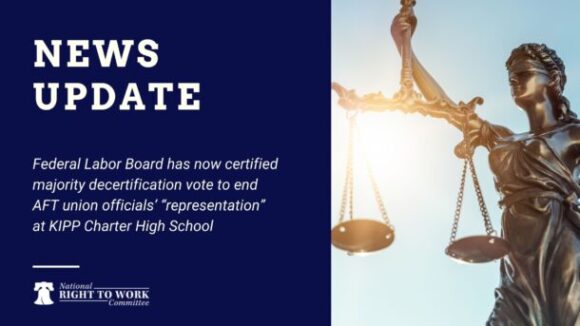Will Team Biden Weaponize Workers’ Pensions?
Big Labor abuse of worker pension and benefit funds as a means of advancing union bosses’ self-aggrandizing policy objectives is a familiar phenomenon.

Roughly 105,000 daily commuters to and from New York City depend on New Jersey Transit Corporation (NJ Transit) trains to get to their jobs. But on March 13 rail union bosses who wield monopoly-bargaining power over 4200 rail workers employed by state-owned NJ Transit may order them out on strike.
According to an analysis prepared for the business group Partnership for New York City, such a work stoppage would cost Big Apple business employees and owners $5.9 million an hour. (See the news story linked below for more information.)
NJ Transit officials have already announced that, in case of a rail strike, expanded bus services will be able to provide transportation for fewer than 40% of the commuters who normally ride the system’s trains. That means roughly 65,000 riders will have to make other arrangements. Perhaps 10,000 additional cars an hour will be on roads within 25 miles of New York during the morning and evening rushes as a consequence. A large share of the people who normally commute by rail probably won’t be able to make it to work at all.
What interest is so important to rail union bosses that they are willing to hold the Big Apple hostage in this way to advance it?
According to media reports, the main issue over which a NJ Transit strike may occur is that union bosses insist that no more than 2.5% of the cost of unionized government transit employees’ health insurance be deducted from their wages. They insist that at least 97.5% of the cost be covered by transit passengers and New Jersey taxpayers as additional compensation, above and beyond government employees’ cash pay.
Just last year, a report commissioned by the New Jersey Legislature and accepted by members of both political parties found that employees of large, successful private companies in the Garden State often have as much as 25% of the cost of their health insurance deducted out of their cash pay. Yet the union bigwigs who hold monopoly power to speak for NJ Transit employees demand that they pay no more than a tenth of that, and transit users and taxpayers cover the rest!
Forced-unionism New Jersey already has a state-and-local tax burden equivalent to 12.2% of personal income, higher than all but two other states’. And NJ Transit passenger fares only covered only about 47% of the cost of operations last year. Yet union kingpins are clearly willing to inflict even heavier burdens on NJ Transit customers and taxpayers in order to perpetuate an ultimately unsustainable system.
The fact that a paralyzing NJ Transit strike is even a possibility right now ought to be sufficient reason for state lawmakers and Gov. Chris Christie to revoke their and other government-sector union bosses’ monopoly-bargaining privileges.
But currently the New Jersey Legislature is dominated by Big Labor politicians who are totally uninterested in protecting taxpayers and people who rely on vital public services from monopolistic government unionism. Moreover, Christie has never demonstrated he would be up for such a fight. Achieving genuine reform in the Garden State will be a long and difficult process.
New Jersey Transit Strike Could Cost New York City Nearly $6 Million Per Hour

Big Labor abuse of worker pension and benefit funds as a means of advancing union bosses’ self-aggrandizing policy objectives is a familiar phenomenon.

What impact does handing a union monopoly power to deal with your employer on matters concerning your pay, benefits, and work rules have on your pay?

Federal Labor Board has now certified majority decertification vote to end AFT union officials’ “representation” at KIPP Charter High School